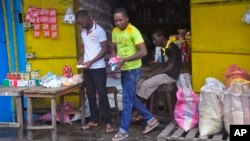The World Health Organization said it is treating as a "top priority emergency" Senegal’s first confirmed case of Ebola and has sent personnel to Dakar.
A 21-year-old Guinean university student, who was exposed in his home country, traveled overland from his town in southern Guinea three weeks ago to stay with relatives in Dakar, where he became ill.
Residents in Senegal’s capital are worried about the disease but are embracing preventative measures.
At a busy market in Dakar, there has been a rush on bleach and soap. Some pharmacies in the capital are rationing hand sanitizer - one bottle per customer.
Some Senegalese said they are taking preventative measures, such as hand washing, seriously.
Mohamed Sagna said, “I am scared because I don’t know this disease and it is the first time in Senegal.”
He said, “Now we are living with those diseased people, so this causes a big problem for authorities to help people to stay well.”
Some criticism
Along with concern has come some criticism that someone who knew he had been exposed to Ebola and was under health surveillance would travel to Senegal.
Sagna said it was “very inconsiderate for him to expose the disease to Senegal.”
In a nearby supermarket, grocery clerk Awa Diop said that since the announcement of the Ebola case on Friday, families have been clearing the shelves of disinfectants.
Diop said she’s scared. "This disease is bad for you," she said. "It’s deadly. It’s really not good.”
Senegal is the fifth West African country to be hit in the regional outbreak that began earlier this year in Guinea and has killed more than 1,500 people, mostly in Sierra Leone, Liberia and Guinea.
Ebola has infected about twice as many.
The Senegalese government said it is monitoring people who may have had contact with the man for signs of the illness, such as fever or vomiting. They continue to search for others who may have been exposed.
Senegal had closed its land border with Guinea earlier but had reopened it at the time the man crossed. The land borders were again shut on August 21.
Nigeria reports another case
Meanwhile, Nigeria said it has a third confirmed case of Ebola disease in the oil hub of Port Harcourt, bringing the country's total confirmed infections to 16, with about 200 people under surveillance, the health minister said on Monday.
A doctor in Port Harcourt died last week after treating a person who had been in contact with Patrick Sawyer, the Liberian-American man who was the first recorded case of the virus in Africa's most populous country.
Sawyer flew from Liberia and collapsed at the Lagos airport on July 20.
The doctor's death raised alarm that Ebola, which looked on the verge of being contained in the commercial capital, Lagos, may flare up again elsewhere.
The shift to Port Harcourt shows how easily containment efforts can be undermined.
Nigeria's government acted quickly at the end of July, setting up an isolation ward and monitoring contacts closely. But one of Sawyer's contacts in Lagos avoided quarantine and traveled east to Port Harcourt.
In Sweden, medical officials said a man suspected of having Ebola shows "no signs" of the deadly disease.
Media reports Sunday said the man had recently traveled to a "risk area" for Ebola and was taken to a Stockholm hospital after coming down with a fever.
But Stockholm city officials said Monday that doctors had ruled out the possibility of the virus.
Liberian measures
On Monday, President Ellen Johnson Sirleaf ordered most civil servants to stay home another month in an effort to stop the spread of the deadly Ebola virus, according to a statement released Monday by her office.
Sirleaf ordered non-essential workers not to come to work and promised that all government workers would still be paid, the AP reported.
Liberia's schools are already closed in the effort to keep large numbers of people from gathering and potentially spreading the disease.
Over the weekend, Liberia's government lifted a quarantine that was imposed as part of efforts to contain the disease.
Residents of West Point, a neighborhood in the capital, Monrovia, had been confined to their area for the past 10 days.
Some information for this report provided by Reuters, AFP and AP.




